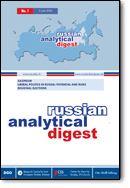No. 269: Russia and the Arctic

Author(s): Troy J. Bouffard, P. Whitney Lackenbauer, Alexander Sergunin
Series Editor(s): Stephen Aris, Matthias Neumann, Robert Orttung, Jeronim Perović, Heiko Pleines, Hans-Henning Schröder, Aglaya Snetkov
Series: Russian Analytical Digest (RAD)
Volume: 269
Publisher(s): Center for Security Studies (CSS), ETH Zürich; Research Centre for East European Studies (FSO), University of Bremen; Institute for European, Russian and Eurasian Studies (IERES), George Washington University; Center for Eastern European Studies (CEES), University of Zurich; German Association for East European Studies (DGO)
Publication Year: 2021
